U.S. public evenly split on whether gun ownership does more to increase or decrease safety
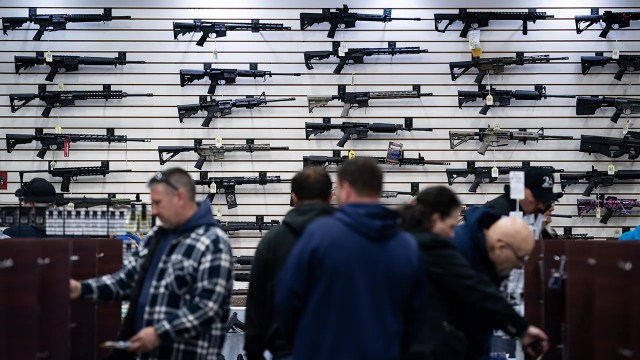
Pew Research Center conducted this study to better understand Americans’ views of gun policy. For this analysis, we surveyed 5,115 adults from June 5-11, 2023. Everyone who took part in this survey is a member of the Center’s American Trends Panel (ATP), an online survey panel that is recruited through national, random sampling of residential addresses. This way nearly all U.S. adults have a chance of selection. The survey is weighted to be representative of the U.S. adult population by gender, race, ethnicity, partisan affiliation, education and other categories. Read more about the ATP’s methodology.
Here are the questions used for the report and its methodology.
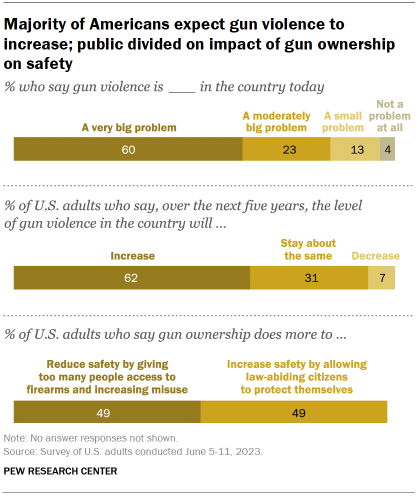
With total gun-related deaths reaching new highs in recent years, growing shares of Americans view both gun violence and violent crime as very big national problems.
Looking ahead, twice as many Americans expect the level of gun violence to increase rather than stay about the same over the next five years (62% vs. 31%). Just 7% say it will decrease.
The question of whether gun ownership does more to increase or decrease safety evenly divides Americans: 49% say it increases safety by allowing law-abiding citizens to protect themselves; an identical share says it reduces safety by giving too many people access to firearms and increasing misuse.
The new survey, conducted June 5-11, 2023, among 5,115 members of Pew Research Center’s nationally representative American Trends Panel, also finds:
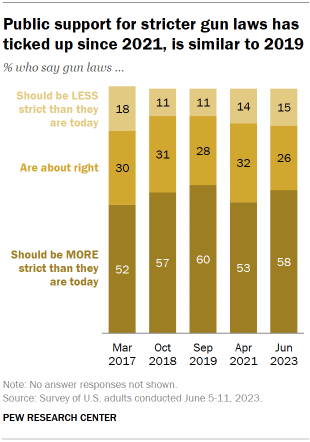
- A majority of Americans (58%) say gun laws in the country should be stricter; 26% say they are about right, while just 15% say they should be less strict. Support for stricter gun laws has ticked up since 2021 and is at about the same level as in 2019.
- Large majorities favor preventing mentally ill people from buying guns (88%) and increasing the minimum age for buying guns to 21 years old (79%).
- Other gun policy proposals, including banning high-capacity magazines (66%) and banning assault-style weapons (64%), continue to draw majority support.
Large divides by party, community type in views of impact of gun ownership on safety
Gun policy continues to be one of the most polarizing issues in American politics. Republicans and Democrats are sharply divided over the impact of gun ownership on public safety: 79% of Republicans and independents who lean toward the Republican Party say that gun ownership increases safety, while a nearly identical share of Democrats and Democratic leaners (78%) say it decreases safety.
Views of gun ownership are also closely tied to where one lives, with those who say they live in rural areas about twice as likely as those who live in urban areas to say that gun ownership increases safety (65% vs. 34%). And those who personally own guns are nearly twice as likely as non-owners to say this (71% vs. 37%).
Overall, 32% of Americans report owning a gun.
Gun violence and violent crime increasingly viewed as major problems
While there are wide partisan gaps in views of the impact of gun ownership and in views of many gun policies, Republicans and Democrats also differ over whether gun violence is a major problem for the country. About twice as many Democrats as Republicans say it is “a very big” national problem (81% vs. 38%).
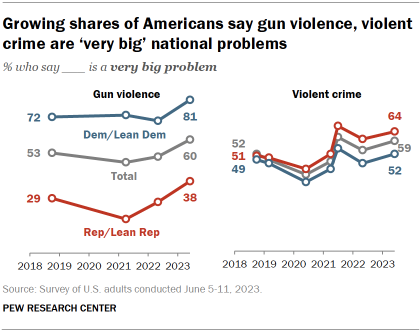
Over the past year, however, there have been 11 percentage point increases in the shares of both parties saying it is a very big problem.
Views of whether violent crime is a major problem have tended to be less partisan. And growing shares in both parties also view crime as a very big problem.
Since last year, the share of Republicans who say violent crime is a major problem has slightly increased from 60% to 64%. There has been a comparable shift among Democrats, from 47% to 52%.
Both violent crime and gun violence rank high on the public’s list of top national problems. Refer to our recent report for more.
CORRECTION (June 28, 2023): In the chart “Growing shares of Americans say gun violence, violent crime are ‘very big’ national problems,” a previous version of the chart omitted a July 2021 data point of the shares saying violent crime was a very big problem for the country. The chart has now been updated to include the following: 61% of Americans (including 67% of Republicans and 55% of Democrats) said violent crime was a very big problem for the country in July 2021.
The following sentence was also updated to reflect the above additions: “Since last year, the share of Republicans who say violent crime is a major problem has slightly increased from 60% to 64%. There has been a comparable shift among Democrats, from 47% to 52%.”
Views of gun policies
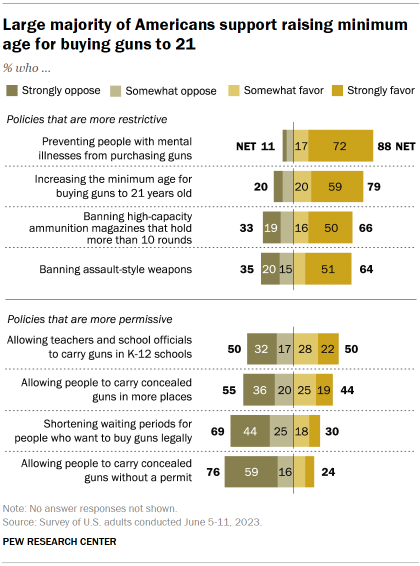
There continues to be wide public support for various specific gun policy proposals. For example, 88% of Americans favor preventing people with mental illnesses from purchasing guns, including 72% who strongly favor this.
This is the only policy proposal among eight asked about in the survey which draws overwhelming bipartisan support (89% of Democrats, 88% of Republicans).
While opinions about most gun policies have not changed much in recent years, an increasing share of the public favors allowing teachers and school officials to arm themselves.
Half of adults now favor allowing teachers and other school officials to carry guns in K-12 schools, up from 43% two years ago.




